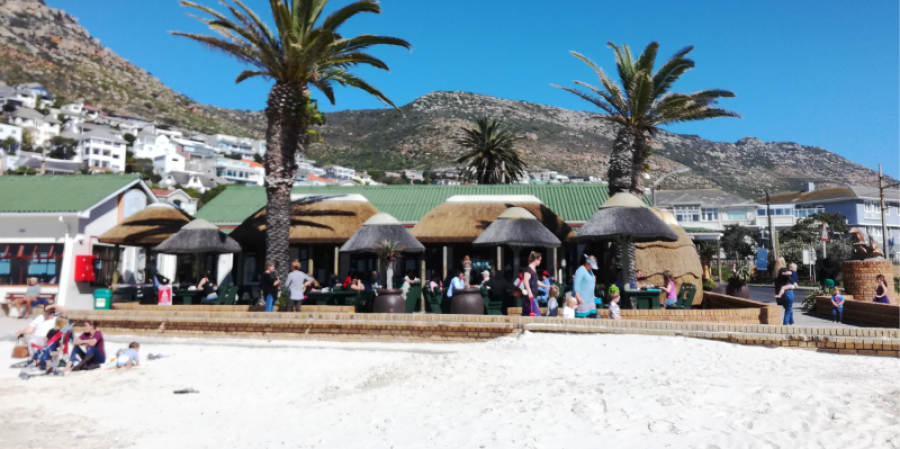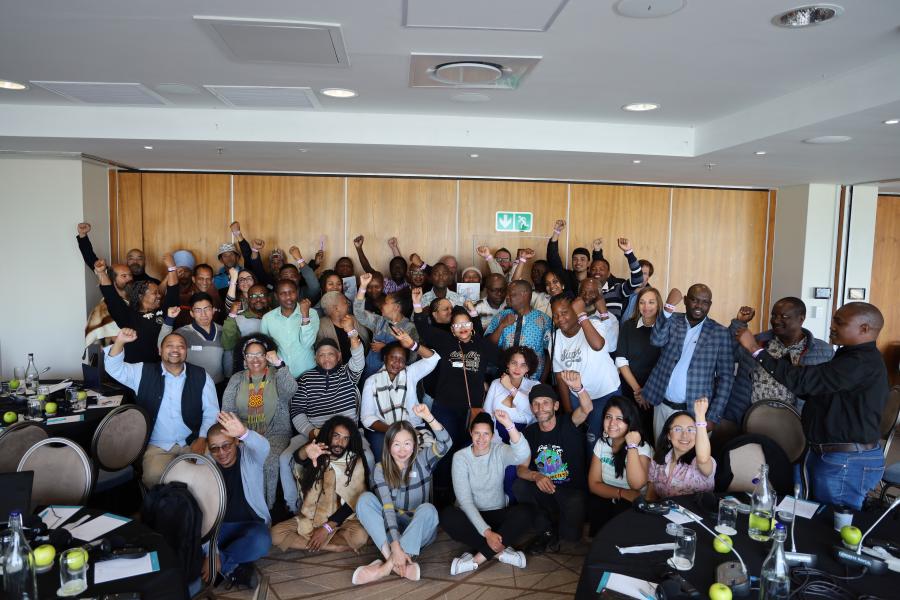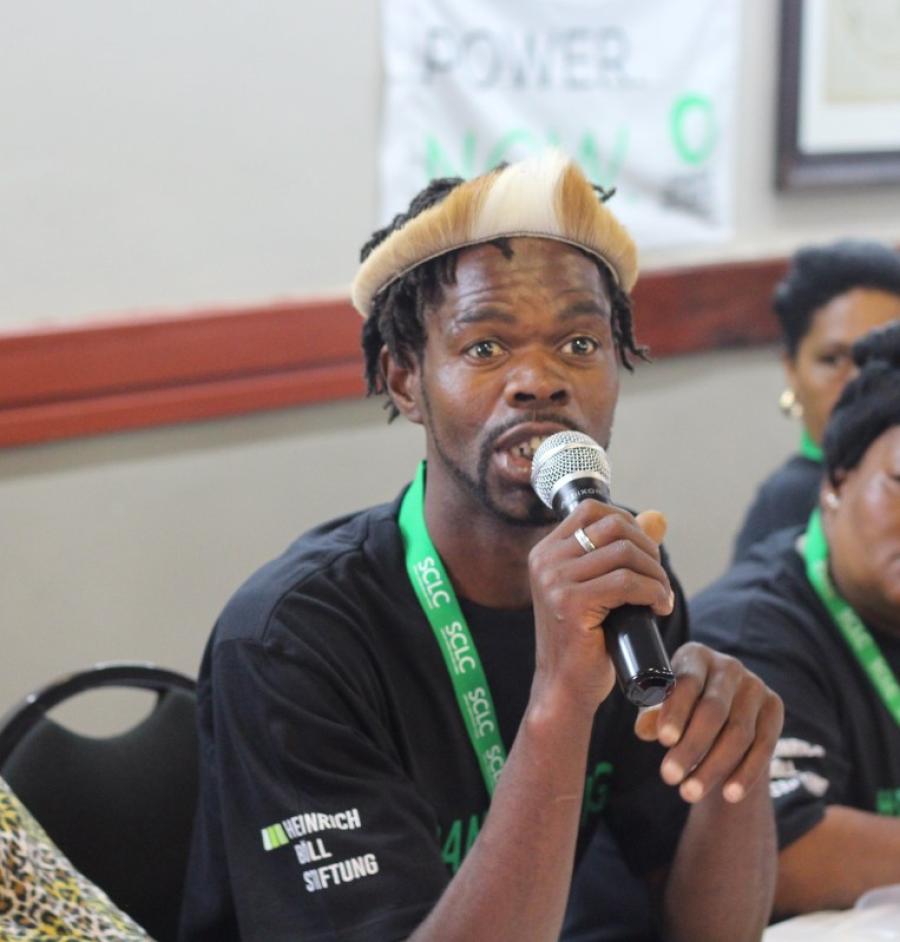"THE PROBLEM STARTED IN 1990, when the ANC [African National Congress] started mobilizing before the release of their old man, [ANC leader Nelson] Mandela. When he was released, they came back from a rally and many people were killed on that day. After that they said that everyone should be ANC. All the people in the area became ANC in fear of children who were killing them. More than a thousand houses were burnt down. Those who were leaders and indunas [headmen] of the chief, like Thousand, were killed. The ANC ran amok in the area and did what they liked...
"About eight youths defected from the ANC and came to us elders. They said they were disillusioned with the ANC because all they were doing was killing people. They said they were now going back to their traditional Zulu roots and joining Inkatha [the Inkatha Freedom Party]. They complained that in the ANC nobody was advising anybody. The eight youths then said they want to work with elders in solving problems through negotiations and not through violence, necklacing [a burning tire is placed around the necks of those seen as traitors], and beheading. ANC youth then attacked the eight dissidents and that led to severe conflict and violence.
"It went on and on. We have constantly been attacked just like I have been telling you that we were burying our dead last weekend."
"THIS LAND WAS TRIBAL LAND belonging to Chief Cele, and this area was controlled by his induna, Thousand. [Thousand] allocated sites to people, but as time went on he became a warlord who collected protection money from us. He brutally dealt with his opponents, and the community turned against him and his henchmen. There was a fight and Thousand and his henchmen fled the area. Then we as the community decided to elect our own structures democratically, which would be responsible for the allocation of sites and the running of the area....
"Later we found out that within the community there were criminals who had helped us get rid of Thousand and his men with the hope that they would be free to continue with their criminal activities. These criminals refused to be disciplined by the structure in place then, and they turned against us and a war broke out...
"Some people in the community, including families of some of the criminals who had been disciplined for their criminals activities, formed their own gang. The community was divided in two. The criminals adopted the na,e `Sinyoras' and continued their criminal activities within their new adopted community. They lost support of this community and joined Inkatha. They were allowed to be members of Inkatha and were embraced by the Inkatha leaders from the township."
These quotes illustrate the opposing views on the causes of the ongoing strife in the Malukazi squatter camp. Such camps have proliferated on the peripheries of South Africa's cities for several reasons: inadequate township construction programs, apartheid-related relocations of people from the inner city and from white farms, deteriorating conditions in the overcrowded, hilly, and unproductive "homelands," and the search for employment in the cities. A major reason for the growth of the squatter settlements south of Durban is the proximity of industrial areas to African residential areas. The areas full under tribal control, and hence outside apartheid regulations.
Located on the southern border of Umlazi township, the Malukazi shack settlement has been the site of extensive strife since the mid-1980s. One of the oldest and most destitute of Durban's squatter areas, it is composed of dilapidated ramshackle shacks and lacks any basic services - running water, sewers, electricity, roads. Malukazi gives the immediate impression of a community in constant fear of attack, perpetually vigilant and wary of outsiders.
Malukazi is divided into two geographically distinct political camps dominated ostensibly by Inkatha supporters on one side and ANC supporters on the other. Previously under tribal control, over the past few decades the area has experienced a rapid influx of people, with far-reaching effects on local authority and resident communities.
LAND POLICY IS TRANSFORMED
Originally occupied by members of the Cele tribe, the area began to draw settlers in the late 1960s with the building of the African township of Umalzi. New resident, coming from rural areas and recently "sanitized" inner-city shack settlements, usually applied to local indunas for access to small plots of land on which to erect rudimentary dwellings.
As population pressures increased, agricultural population began to tax the land. In addition, the process of land settlement itself underwent a transformation - from the traditional system whereby indunas allocated land on behalf of the chief to a new system under which local landlords leased or sold land and dwellings to new settlers. As a result, the chiefs and same of the indunas became marginal to the de facto land-allocation process.
With the influx of new settlers into Malukazi in the 1970s, older residents began to lose their access to agricultural land. Furthermore, the land they had originally received came under threat of "appropriation" by indunas and landlords who sought to maximize their income. In response many older residents took to becoming small-scale landlords themselves, renting out small parcels of their farming land to shack dwellers or building rooms that they leased to tenants.
The emergence of landlords overturned Malukazi's social structure. A system once built on kinship and tribal identity became based on property and tenant-landlord relationships. New settlers owed more allegiance to their landlord than to the tribal chief, and the older residents were left in the middle, with no single authority figure.
The most powerful landlords not only allocated land but settled disputes, imposed fines, and even expelled certain residents. They became, in effect, "mini-chiefs." Some even became warlords who increased their areas of control through raids and attacks. The building of formal townships to house the African labor force also helped erode tribal authority. The appropriation of tribal land for township construction meant that the tribal chiefs lost not only land and authority but people.
This shifting power structure has left a "shadow map" of land ownership and authority in many townships technically are run by town councils - which are contested by the civic and youth movements - invisible and residual "shadow" structures harking back to the traditional authorities overlay this formal map. some older residents still pay allegiance to tribal structures. However, the shack settlements have created new rules regarding land allocation, patronage, and power. Some of these areas are still tightly controlled by the tribal authorities; some are ruled by shack lords and warlords; others are run by young comrades or civic groups. Joining this transition process during the 1970s and 1980s are the continued proletarianization of the African people, an expanding militant labor union movement, a renewed political challenge to the aprtheid government following the 1976 Soweto rebellion, and the beginning of a deep-seated, long-term economic recession in South Africa.
ROOTS OF VIOLENCE
It is the intersections and overlaps among ethnic, racial, tribal, local, political, and even criminal, violence, together with widespread opposition to apartheid, that make it so difficult to resolve the current unrest that plagues South Africa. Malukazi's troubles are a microcosm of South Africa's ongoing strife.
In the 1980s, conflict rose in South Africa, as access to land, jobs, and water declined in the face of growing population pressure and an ongoing economic recession. The township and squatter youth became intensely politicized, organizing themselves to oppose the apartheid state, the black councilors, the tribal authorities, and the authorities in the ethnically determined homelands. The black town councils lost effective power in most African townships, although traditional authorities still claimed partial control over some shack areas through the induna and Inkatha structures.
The current violence in South Africa is generally fueled by a struggle for limited material resources in the context of a political system that had relegated little land to the African majority, controlled access to the cities and skilled jobs on a racial basis, and excluded blacks from any meaningful political participation. The violence is further complicated by rivalries between clans and ethnic groups and among various black movements.
At the end of 1985, violence between the Zulu- and Pondo-speaking Malukazi residents was on the increase. The Pondos retreated to a nearby shack settlement (known as Number 5), where a Pondo enclave had developed under the patronage of a Zulu landlord. This landlord was charging Pondos higher rents due to their relatively restricted access to land in KwaZulu, which is the Zulu "reserve" located in Natal. Subsequent to the arrival of these evacuees in Number 5, Chief Cele from Malukazi sent this landlord a letter threatening to expel the Pondos if they were accommodated in the area.
Pondo residents then launched raids into Malukazi, killing Zulu residents and destroying homes. After a series of raids and counterraids that lasted until late January 1986, Zulus razed Number 5 and drove the Pondos out with a rallying cry that the Pondos had taken Zulu land, jobs, water, and other resources. On the other hand, Pondo people wanted to reclaim the land they had lost when fleeing Malukazi and retain their jobs or at least a foothold in the urban area; otherwise they would be relegated to a meager existence in the infertile, drought-ridden rural hinterland of Transkei.
Responses from Chief Makhanya, chief for the Umbumbulu district in which Number 5 is located, illustrate how Zulu residents had earlier viewed Pondos in a different light. "The 1960s were a good time, as there were lots of jobs for people and also lots of space for people to build homes," said Chief Makhanya. By the 1980s, he added, "grumbles began to be heard about the Pondos who were taking over the area. Zulus thought that they should have first preference as they were on the land long before the Pondos."
According to Chief Makhanya, local Zulus increasingly felt that "the Pondos must go back to the Transkei because there is no place for a Zulu to make a home here any more." Despite the fact that Pondos were a minority, their cultural and ethnic distinctiveness from Zulus made it easier for Zulus to blame them for deteriorating conditions that in reality were widespread in South Africa as a whole.
After a period of quiescence in the mid- to late 1980s, during which the shack lords and warlords consolidated their power, a new cycle of violence erupted in Malukazi, this time between militant youth and civic members inspired by the ideals of the United Democratic Front (a national umbrella organization of civic groups) and the ANC on the one hand, and the ideals of Inkatha, shack lords, and warlords on the other. Since then, distinct geopolitical turfs have been carved out, leaving in between a no-man's-land of destroyed shacks surrounded by tall weeds and shrubs that are periodically burned by both sides to keep watch on each other's movements.
The de facto political practice of the squatter areas is essentially survivalist. The reasoning is simple: if residents don't support the hegemonic group or individual in their particular area, they face losing their homes and possessions and becoming refugees of the violence. So people walk a political tightrope between demonstrating support for the present group holding power and making sure that this apparent support is not used against them when the balance of power swings.
On both sides of the political divide stories of past attacks and fear of future violence keep the residents under the thumbs of the respective leaders, be they warlords or comrades. Violence has elevated these leaders and their "soldiers" to positions of relative status within the community, positions that would be shaky in the absence of violence.
Paradoxical as it may seem with virtually all Malukazi residents now of Zulu origin, ethnicity still features in the violence - but in a strangely mutated form. Inkatha supporters believe they are the sole Zulu representatives and argue that Zulu-speaking ANC supporters in Malukazi (and elsewhere) have sold out and become Xhosa, or "children of Mandela" (who is Xhosa). Thus, ethnicity or tribal identity is not seen as inherited but rather as in a constant state of flux, to be claimed or renounced according to one's current politics.
WINNERS AND LOSERS
This is a war in which there will be no outright winners. All sides - in particular the shack dwellers themselves - stand to lose a great deal.
In Malukazi today, the shack lord-cum-warlod replaces the chief as the local patriarch who dispenses land, settles disputes, demands patronage, and organizes raids on nearby areas. The system of "khonza" - whereby allegiance, respect, and goods are given to the chief - has been replaced by economic relations in which the shack or warlord demands payment for protection, transportation, membership fees, rentals, and so on.
In those shack areas that have been "won" by the young ANC comrades, traditional and cultural norms are turned on their heads. They, too, extract various forms of payment and tribute from residents in the form of supplying soldiers and paying for funerals, transportation, weapons, food, and so on. No longer are the elders accorded the respect and authority they had once demanded. Rather, the educated, politically active, and militant youth have risen to positions of domiance in the community. Such areas may evidence a strong residue of traditional expectations among the adults, especially the older men who look back with nostalgia to when their views were respected and their word was regarded as law in the family or the wider community.
In both scenarios, aspects of traditional and cultural values and beliefs survive. However, in situations rife with violence, the warrior aspects are most likely to survive: the songs, organizational and battle tactics, and weaponry.
Talk of peace may seem futile in such an atmosphere, but peace must be pursued. First, either the militant approach of the current leaders must be transformed, or new leaders must emerge who are solely concerned with pacific politics and developmental goals. This, however, isn't enough. An effective and nonpartisan police force must be established to ensure that the instigators of violence are punished, thus making room for local leaders who are genuinely committed to peace.
Formalizing land allocation is also a priority in Malukazi. This would remove the material basis for control by the landlords, warlords, youth, or militant groups and would give residents a secure asset in which they can invest.
All these developments would encourage the emergence of a culture that promote freedom of choice. They would give shack dwellers the space to choose their cultural practices and political policies without fear of intimidation, exclusion, or even death.
Article copyright Cultural Survival, Inc.



